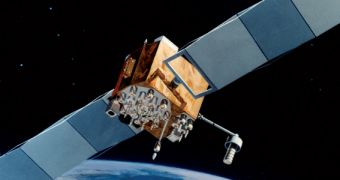In a press release provided by the Boeing Company on Tuesday, April 8, officials from the corporation announced that the United States Air Force (USAF) had taken reception of the fifth satellite in the Global Positioning System (GPS) 2F series of spacecraft. The vehicle was already been launched, the document added, although the USAF kept everything under wraps.
Takeoff occurred from the Cape Canaveral Air Force Station (CCAFS) in Florida, on Thursday, February 20. The satellite was carried into its semi-synchronous, medium Earth orbit by a Delta IV rocket developed by the United Launch Alliance (ULA). The launch was delayed by a total of 5 months, following issues related to the performances of the rocket's upper stage.
All GPS Block IIF satellites are placed on an orbital perch some 20,460 kilometers (12,710 miles) above Earth surface, and feature an orbital period of 12 hours. Five of these spacecraft are already in service, with an additional 7 planned for development later on. The Boeing statement also revealed that the USAF had successfully concluded the in-orbit activation and payload verification phases.
“As each GPS IIF joins the fleet, we are sustaining and modernizing the constellation for years to come. With this latest successful handover, Boeing is maintaining a robust operating rhythm this year to support the GPS program,” explained the vice president and general manager of Boeing Space and Intelligence Systems, Craig Cooning, as quoted by Space News.

 14 DAY TRIAL //
14 DAY TRIAL //